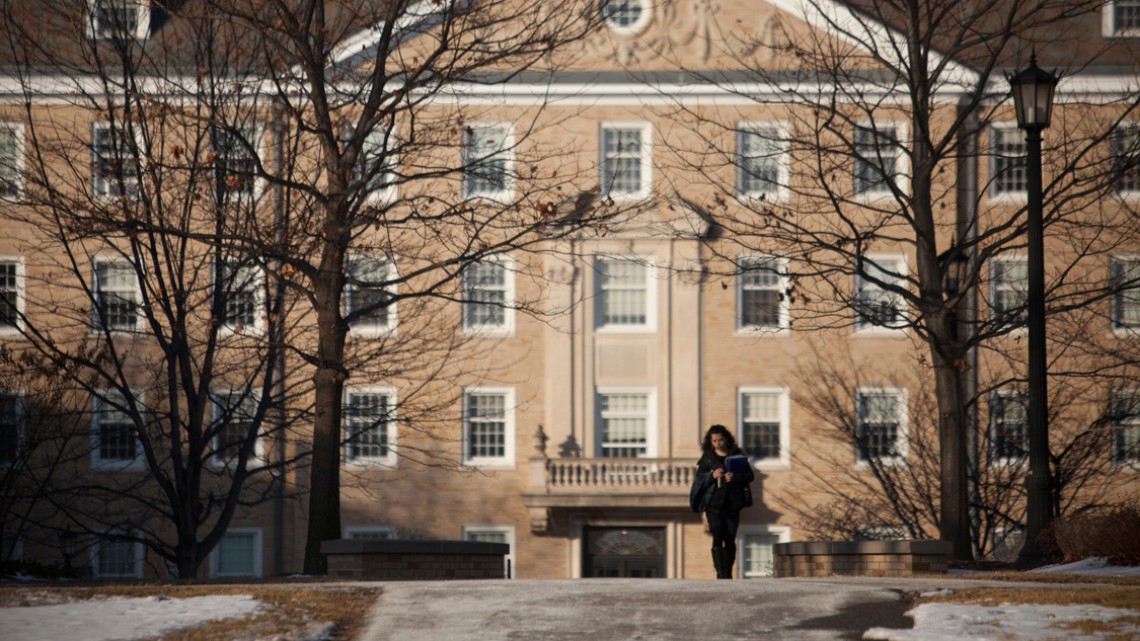
Martha Van Rensselaer Hall.
Faculty committee recommends public policy college
By James Dean
A faculty committee charged with implementing recommendations to enhance the visibility and impact of the social sciences at Cornell has concluded its report, which makes recommendations on the establishment of a public policy entity and strengthening social sciences departments across the university.
The Social Sciences Implementation Committee offered its recommendation in a final report submitted to President Martha E. Pollack and Provost Michael I. Kotlikoff and released publicly Jan. 16.
Refocusing the College of Human Ecology into a public policy college would be the best way for Cornell to build excellence in public policy, the committee has concluded.
That recommendation for how best to elevate policy research, teaching and outreach was preferred by a majority of the committee, with four of 10 voting members instead preferring to create a new school of public policy, shared by the College of Human Ecology (CHE) and the College of Arts and Sciences (A&S). The report outlines the advantages and disadvantages of each approach.
The committee strongly supported creating new or expanded “superdepartments” in economics, psychology and sociology as another opportunity to strengthen the social sciences over the next 10 to 15 years. These new departments were discussed over the past semester by faculty within the individual disciplines.
Pollack and Kotlikoff plan to make decisions about a policy entity and the superdepartments later this semester.
In a statement to the university community, Kotlikoff thanked the Implementation Committee for its “exhaustive efforts” since convening last April, and faculty, staff, students and alumni for their participation and thoughtful feedback.
“In the coming weeks, President Pollack and I will be examining the committee’s final report in consultation with university and college leadership as we decide which recommendations to pursue,” Kotlikoff said. “Throughout the process, our commitment will be to strengthen public policy at Cornell, while continuing to support other less policy-focused faculty within the College of Human Ecology.”
Concerns about the future of CHE’s four nonpolicy departments were a prominent theme during nearly 20 listening sessions with stakeholders that followed the Implementation Committee’s November release of an interim report.
In its final report, the committee urged university leadership to “carefully and comprehensively account for such impacts” in its deliberations.
Feedback on the final report can be emailed to the provost at ssreview@cornell.edu. Any structural changes to CHE or individual departments are expected to take years to implement and, the provost has stressed, would not result in job losses for faculty or staff.
The Implementation Committee envisioned the proposed public policy college continuing to house nonpolicy CHE elements, while noting that decisions at that level of implementation were beyond the committee’s charge.
Despite some tension created by that coexistence, a majority of the committee believed only the college model delivered the independence, resources, infrastructure and visibility needed to achieve Cornell’s policy aspirations. A shared school, they feared, would increase administrative complexity and struggle to recruit an influential dean.
The minority argued that a school would more naturally link the two colleges specializing in policy, and with a sharper focus than a college some might view as a “re-badged CHE.” They also considered unrealistic the committee’s charge to focus on a policy structure without weighing broader impacts to CHE, according to the report.
In recommending a public policy college, the committee’s majority acknowledged it was supporting a path that “would encounter significant resistance and would also have to overcome serious obstacles.”
The proposed superdepartments, assessed by three subcommittees, also present practical obstacles, the report found, relating to issues such as hiring, promotion, governance, balancing of academic specialties and co-locating expanded departments.
Despite those challenges, the committee concluded “nearly unanimously” that, over the long term, the superdepartments would “benefit the respective disciplines and therefore the social sciences more broadly.”
If approved, faculty from the Department of Economics – already a superdepartment, merging faculty from A&S and the ILR School – would join forces with economists from CHE’s Department of Policy Analysis and Management (PAM). Faculty from CHE’s Department of Human Development would combine with faculty in the Department of Psychology in A&S. And sociologists based in A&S and PAM would join together to form a new department in sociology.
With the Implementation Committee’s recommendations, a multiyear review of how to increase excellence and visibility in the social sciences is entering its final phase. Launched in 2016 and involving multiple faculty committees, the review has sought to address a long-held concern that Cornell’s widely dispersed work in social sciences represents less than the sum of its parts.
Moving forward, the Implementation Committee said that both the public policy and superdepartment initiatives will require significant investment and coordination to succeed.
The Implementation Committee was led by co-chairs Melissa Ferguson, professor of psychology and senior associate dean of social sciences; John Siliciano, deputy provost and professor of law; and Christopher Wildeman, professor of policy analysis and management and associate vice provost for the social sciences.
“This is an exciting time for the social sciences,” the committee concluded.
Visit the Office of the Provost’s website for more information on the provost’s review of the social sciences.
Media Contact
Get Cornell news delivered right to your inbox.
Subscribe
